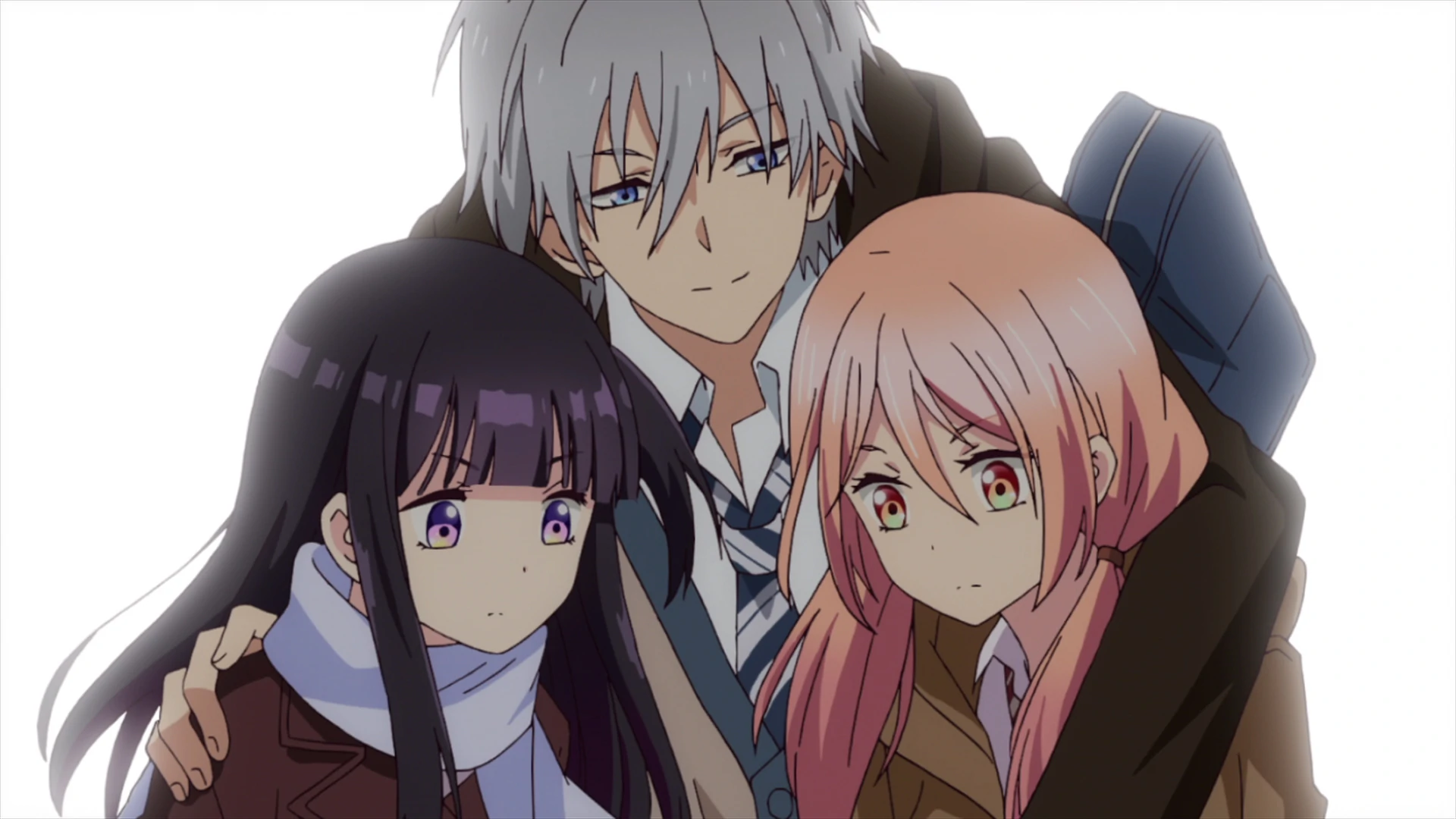NTR In Anime Full Form: The Ultimate Guide For Fans
Ever wondered what NTR means in anime and why it's such a big deal? Well, buckle up, because we're diving deep into the world of anime tropes, drama, and relationships. If you're here, chances are you've stumbled upon the term "NTR" while exploring anime forums, watching your favorite shows, or even chatting with fellow fans. But what exactly is it, and why does it matter? Let's break it down for you, piece by piece.
NTR in anime full form stands for "Netorare," a Japanese term that translates to "being cuckolded" or "having one's partner cheated on." Sounds intense, right? Well, it is! This trope often explores themes of betrayal, forbidden love, and emotional turmoil, making it both controversial and captivating. Whether you're a hardcore anime enthusiast or just curious about the term, this article will give you all the deets you need.
Before we jump into the nitty-gritty, let's set the stage. Anime is more than just cute characters and flashy action sequences. It's a universe filled with rich storytelling, diverse genres, and complex themes. NTR is just one of those themes that keeps fans talking—and sometimes arguing—for hours. So, if you're ready to unravel the mystery behind NTR, let's get started!
- Comprehensive Guide To Universal Property Casualty Insurance Company
- Experience The Hidden Gem Dyker Beach Golf Course In Brooklyn
Understanding the Basics of NTR
First things first, let's clear up any confusion. NTR, or Netorare, is a trope that revolves around the idea of a character's partner being seduced or cheated on by someone else. This can lead to intense emotional drama, character development, and sometimes, unexpected twists. While it might sound like a simple concept, NTR can take on many forms depending on the anime's tone and genre.
For instance, some shows use NTR as a comedic device, while others dive deep into the psychological impact of betrayal. It's all about how the story is told and the emotions it evokes. And let's be real—fans have strong opinions about it. Some love the drama, while others find it overused or even offensive. But hey, that's what makes anime so fascinating!
Why is NTR So Popular in Anime?
Now, you might be wondering why NTR has become such a staple in the anime world. The truth is, it taps into universal themes like love, trust, and jealousy. These are emotions that everyone can relate to, no matter where you're from or what language you speak. By exploring these themes, NTR adds depth to characters and relationships, making the story more engaging.
Plus, let's not forget the fanbase. Anime fans love discussing and theorizing about their favorite shows, and NTR gives them plenty to talk about. Whether it's debating the moral implications of the trope or analyzing character motivations, there's always something new to discover. And let's be honest, a little drama never hurt anyone, right?
Common Misconceptions About NTR
Before we go any further, let's address some common misconceptions about NTR. First off, not all NTR is created equal. Some shows handle the trope with care, using it to explore deeper themes, while others might use it purely for shock value. It's important to approach each story with an open mind and judge it on its own merits.
Another misconception is that NTR is only for a specific audience. While it's true that some fans are drawn to the trope, it doesn't mean everyone who watches anime has to love it. In fact, many fans appreciate when shows steer clear of overused tropes and focus on original storytelling instead. It's all about personal preference, and there's no right or wrong way to enjoy anime.
Breaking Down NTR: Key Elements
So, what makes a good NTR story? Well, like any great narrative, it comes down to character development, plot progression, and emotional resonance. Let's break it down into some key elements:
- Complex Characters: The best NTR stories feature characters with depth and motivation. They're not just archetypes or stereotypes; they're people with their own desires, fears, and flaws.
- Authentic Relationships: Whether it's romance, friendship, or rivalry, the relationships in the story should feel genuine and relatable. This helps viewers connect with the characters and invest in their journeys.
- Emotional Impact: NTR isn't just about shock value—it's about creating an emotional connection with the audience. A well-written NTR story will leave you thinking long after the credits roll.
Of course, these elements aren't exclusive to NTR. They apply to any good story, regardless of genre or medium. But when done right, they can elevate the NTR trope from a simple plot device to a powerful narrative tool.
Examples of NTR in Anime
Let's take a look at some popular anime that incorporate NTR into their storylines. These examples will give you a better understanding of how the trope is used in different contexts and genres.
- Elfen Lied: While not solely focused on NTR, this psychological thriller explores themes of betrayal and trust through its complex characters and intense plot twists.
- High School DxD: Known for its harem-style storytelling, this series often delves into romantic complications and moral dilemmas, making it a prime example of NTR in action.
- Freezing: Combining action, romance, and a dash of NTR, this show keeps viewers on the edge of their seats with its thrilling battles and emotional conflicts.
These are just a few examples, but they showcase the versatility of the NTR trope in anime. From dramatic to comedic, there's something for everyone to enjoy.
The Psychology Behind NTR
Now, let's get into the nitty-gritty of why NTR resonates with so many viewers. It's not just about the plot or the characters—it's about the emotions it evokes. NTR taps into primal fears and desires, making it a powerful tool for storytelling. But what exactly is going on in our brains when we watch these scenes?
Research shows that humans are naturally drawn to stories that challenge our beliefs and emotions. NTR does just that by presenting scenarios that force us to confront our own values and assumptions. Whether we're rooting for the betrayed partner or the seducer, we're engaging with the story on a deeper level. And let's not forget the thrill of uncertainty—will the characters reconcile, or will the betrayal lead to something even more dramatic?
Impact on Fans and Culture
It's no secret that NTR has had a significant impact on anime culture. From fan art to fanfiction, fans love to explore and expand on their favorite tropes. But what does this mean for the industry as a whole? Some argue that overusing certain tropes can lead to stagnation, while others believe it fosters creativity and innovation.
Ultimately, the impact of NTR depends on how it's used. When done well, it can add depth and complexity to a story. When done poorly, it can feel like a cheap gimmick. As fans, it's up to us to support the creators who push boundaries and challenge conventions, while also holding them accountable for their choices.
NTR in Other Media
While NTR might be most commonly associated with anime, it's not limited to that medium. The trope has made its way into manga, light novels, video games, and even Western media. This cross-pollination of ideas shows just how universal the themes of NTR really are.
For example, video games like "Nier: Automata" and "The Witcher 3" explore similar themes of betrayal and forbidden love, albeit in different contexts. These games prove that NTR isn't just a niche anime trope—it's a storytelling device that transcends cultural and linguistic barriers.
Comparing Anime NTR to Western Counterparts
So, how does anime NTR stack up against its Western counterparts? While the core themes might be similar, the execution can vary greatly depending on cultural differences and audience expectations. Anime tends to lean into the emotional and psychological aspects of NTR, while Western media might focus more on the action or adventure elements.
That's not to say one is better than the other—just different. Both approaches have their strengths and weaknesses, and it's up to the viewer to decide which resonates with them more. After all, isn't that what makes storytelling so fascinating?
The Future of NTR in Anime
As the anime industry continues to evolve, so too does the use of NTR. With new technologies, platforms, and storytelling techniques emerging, creators have more tools than ever to explore this trope in fresh and exciting ways. But what does the future hold for NTR?
Some predict that NTR will become even more nuanced and layered, with creators focusing on character development and emotional authenticity. Others believe it might evolve into something entirely new, blending with other genres and tropes to create something truly groundbreaking.
Trends to Watch
Here are a few trends to keep an eye on as NTR continues to grow and change:
- Increased Diversity: As the industry becomes more inclusive, we might see NTR stories featuring a wider range of characters and perspectives.
- Experimental Storytelling: With the rise of interactive media and virtual reality, creators have the opportunity to tell NTR stories in ways that were once impossible.
- Global Collaboration: As anime gains popularity worldwide, we might see more collaborations between Eastern and Western creators, leading to new and exciting takes on the trope.
Only time will tell where NTR goes from here, but one thing's for sure—it's not going anywhere anytime soon.
Conclusion: Is NTR Right for You?
So, there you have it—the lowdown on NTR in anime. Whether you're a die-hard fan or just curious about the trope, there's no denying its impact on the anime world. But here's the real question: is NTR right for you?
Ultimately, that depends on your personal preferences and what you're looking for in a story. If you enjoy emotional drama, complex characters, and thought-provoking themes, NTR might be worth exploring. But if you're not into the whole betrayal thing, that's okay too! There's a whole world of anime out there waiting to be discovered.
So, what are you waiting for? Dive into the world of anime, explore new stories, and most importantly, have fun. And don't forget to share your thoughts in the comments below. Who knows—your next favorite show might just be waiting for you!
Table of Contents
- Understanding the Basics of NTR
- Why is NTR So Popular in Anime?
- Common Misconceptions About NTR
- Breaking Down NTR: Key Elements
- Examples of NTR in Anime
- The Psychology Behind NTR
- Impact on Fans and Culture
- NTR in Other Media
- Comparing Anime NTR to Western Counterparts
- The Future of NTR in Anime
Thanks for reading, and remember—whether you love NTR or hate it, the most important thing is to enjoy the journey. Happy watching!



Detail Author:
- Name : Nasir Lehner MD
- Username : uriel.bruen
- Email : wallace99@lesch.org
- Birthdate : 1996-06-10
- Address : 950 Nitzsche Mountain South Eloisa, AK 39053-6079
- Phone : 1-580-330-7364
- Company : Ward, Ernser and Kuhn
- Job : General Practitioner
- Bio : Vel consectetur omnis aut est. Et et ut corrupti. Doloremque tempore reiciendis sint expedita. Aut omnis assumenda iure eum sed molestiae dolor.
Socials
linkedin:
- url : https://linkedin.com/in/rupert_langosh
- username : rupert_langosh
- bio : In dolor sequi vel quo adipisci ut.
- followers : 909
- following : 2313
tiktok:
- url : https://tiktok.com/@rupert906
- username : rupert906
- bio : Praesentium quidem assumenda explicabo.
- followers : 3011
- following : 1189
facebook:
- url : https://facebook.com/rupert.langosh
- username : rupert.langosh
- bio : Vel sint eligendi et ducimus ipsa.
- followers : 4158
- following : 2682
twitter:
- url : https://twitter.com/rupert_langosh
- username : rupert_langosh
- bio : Ea hic ratione magni. Quis minima soluta laboriosam cum sit est vel. Ad et et et sed expedita quo debitis.
- followers : 2179
- following : 1763